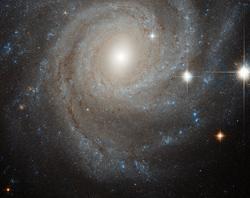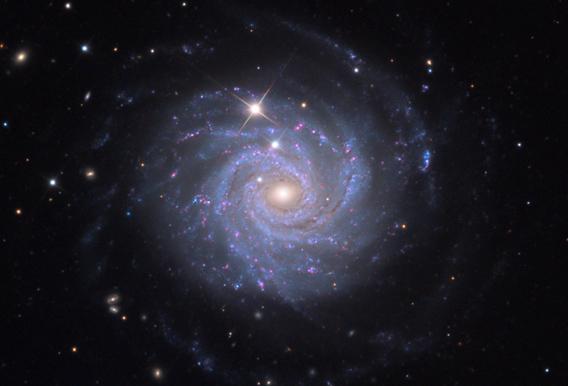A little while back, I wrote an article about some new results dealing with the structure and formation of the Milky Way, our home galaxy. While I was digging through my emails looking for news about those studies, I found an unrelated note sent earlier from astronomer Adam Block, who frequently lets me know when he has cool pictures he’s taken. I had overlooked it somehow, but I’m glad I found it.
Shown above, that’s NGC 3344, photographed by Block using the 0.8 meter (32 inch) Schulmann Telescope (RCOS) on Mt. Lemmon in Arizona. It’s a magnificent face-on spiral galaxy about 20 million light years away… and when I saw that was the distance, my scientist-alarm pinged inside my brain. It seemed like an odd distance. Why, you ask?
Our galaxy is in a small collection of 50 or so galaxies called the Local Group, and it’s a few million light years across (the Andromeda Galaxy is the only other big galaxy in the group, and it’s less than three million light years distant). The M81 Group is another small clot of galaxies about 10 million light years away, for example. The nearest actual cluster to us is the Virgo Cluster, about 50 million light years away, and it has well over 1000 galaxies in it.
So the distance to NGC 3344 is a bit weird; it’s neither here nor there. It’s apparently part of a small spur off the big Virgo Supercluster, a huge collection of clusters themselves, which contains the Virgo cluster, the Local Group, the M81 Group, and many more. Still, this means NGC 3344 is relatively isolated, off more-or-less by itself.

Photo by ESA/Hubble & NASA
It’s a fantastic example of an intermediate spiral; the arms not too tightly wound, not too flung open. It has a mild bar in the center, a rectangular extension of stars commonly seen in spirals; the Milky Way has one. In Adam’s picture you can see dozens of pinkish clumps indicating the presence of warm hydrogen; a dead giveaway that those are sites of ongoing star formation. The bright star just above the galactic center is most likely one inside our own galaxy, fortuitously and coincidentally placed.
If I had to pick a favorite type of object in our Universe, it may very well be grand-design spiral galaxies. They posses grace, beauty, and hold a vast amount of scientific interest. Even if we didn’t live in one, I suspect they would still hold a very special place for me.
